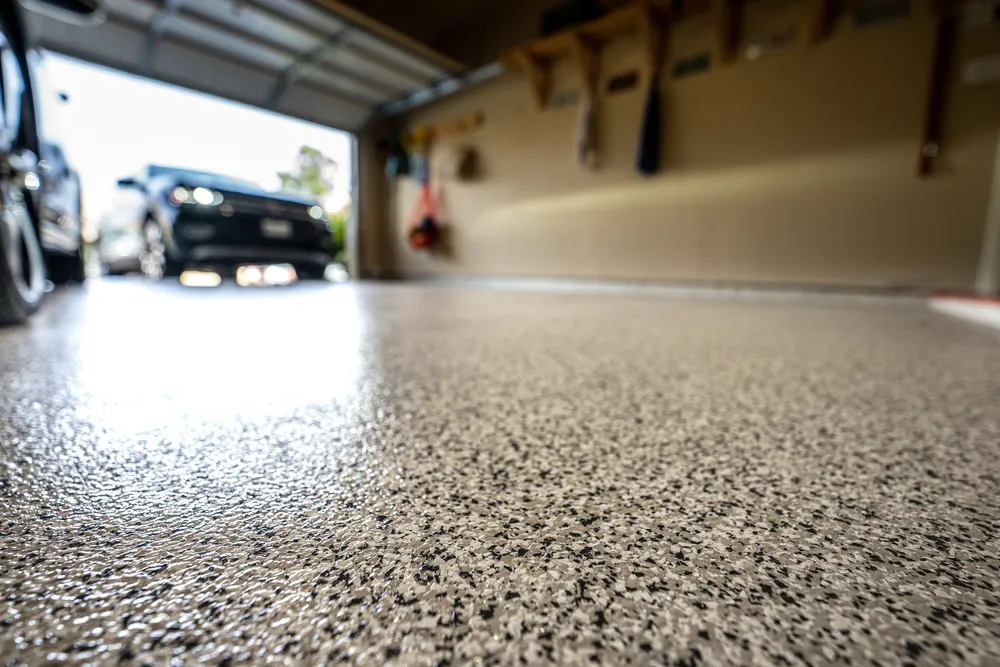When it comes to adding to the look of your garage floor, epoxy coating is a fantastic choice. Not only does it enhance the appearance of your garage, but it also adds durability and protection to the concrete surface. However, many people wonder about the cost of epoxy garage flooring. This comprehensive guide will break down the factors that influence the cost and provide you with valuable insights.
What Influences Epoxy Garage Floor Cost?
The cost of epoxy garage flooring can vary based on several key factors:
Size of Your Garage:
The size of your garage is the main determinant of the overall cost. Larger garages require more epoxy materials and labor, which can increase the expense.
Condition of the Floor:
The condition of your existing garage floor plays a role in the cost. If your floor has cracks, stains, or other damage, it may require repairs before applying epoxy, adding to the total cost.
Type of Epoxy:
There are different types of epoxy coatings available, each with its price point. The type you choose will affect the overall cost. Common epoxy types include water-based, solvent-based, and 100% solid epoxy.
Labor:
The method of installation also impacts cost. Doing the project yourself (DIY) is more budget-friendly, but hiring professionals for installation will result in a higher total cost.
Average Cost Range:
To give you a rough idea of the cost, here is the average cost range for epoxy garage flooring:
- DIY Project: If you opt for a DIY project, you can expect to spend approximately $100 to $600 on epoxy materials, depending on the type of epoxy you choose and size of your garage.
- Professional Installation: Hiring professionals for installation can range from $3 to $7 per square foot, including labor and materials.
DIY vs. Professional Installation:
Choosing between a DIY project and a professional installation depends on your budget and skill level. DIY is more cost-effective but can be challenging for those without experience. Professionals ensure a smoother finish but come at a higher cost.
Types of Epoxy:
Understanding the different types of epoxy coatings can help you make an informed decision:
- Water-Based Epoxy: This option is budget-friendly but may need to be more durable than other types.
- Solvent-Based Epoxy: Solvent-based epoxy offers increased durability but costs more.
- 100% Solid Epoxy: Known for its toughness, 100% solid epoxy is the most durable but also the most expensive option.
Additional Costs:
In addition to the basic epoxy costs, there are some potential additional expenses to consider:
- Floor Preparation: Repairing cracks, stains, or other imperfections may be necessary and can add to the overall cost.
- Design and Patterns: This customization can increase expenses if you desire intricate designs or patterns on your garage floor.
- Topcoat: Adding a protective topcoat is optional but can extend the durability of your epoxy floor. However, it does come with an added cost.
Benefits of Epoxy Garage Flooring:
Epoxy garage flooring offers numerous benefits beyond aesthetics:
- Durability: Epoxy coatings are resistant to stains, chemicals, and wear, ensuring a long-lasting finish.
- Easy Maintenance: Cleaning and maintaining an epoxy floor is simple and requires minimal effort.
- Enhanced Safety: Non-slip options are available, making your garage safer for both vehicles and foot traffic.
- Improved Appearance: Epoxy transforms your garage into a visually appealing space, enhancing its overall look.
Tips for Affordable Epoxy Floors:
If you’re working within a budget, consider these cost-saving tips:
- Choose a Single Color: Complex designs and multiple colors can increase costs. Opt for a single color to keep expenses down.
- DIY Prep: Prepare your garage floor yourself to save on labor costs. Proper preparation is essential for a successful epoxy application.
- Consider Water-Based Epoxy: If your garage has simple requirements, a water-based epoxy may be a more affordable option without compromising quality.
- Shop Smart: Compare prices and look for deals on epoxy materials. Shopping around can help you find the best value for your budget.
- Focus on Essentials: Prioritize durability and functionality over intricate designs if you’re looking to save on costs.
Maintaining Your Epoxy Garage Floor:
To ensure the longevity of your epoxy garage floor, follow these maintenance tips:
- Regular Cleaning: Sweep or mop the floor with a mild detergent to remove dirt and debris.
- Use Safe Cleaners: Avoid harsh chemicals that can damage the epoxy surface.
- Guard Against Chemicals: Protect your floor from spills of chemicals, oil, or other substances that may cause damage.
- Repair Damage: Promptly fix any chips, scratches, or imperfections to prevent further deterioration.
- Handle with Care: Avoid dragging heavy or sharp objects across the floor to prevent damage.
- Reapply Topcoat: Consider reapplying a protective topcoat every 3-4 years to maintain the shine and protection of your epoxy floor.
Conclusion:
Investing in epoxy garage flooring is a smart choice that offers both style and durability. While the cost may vary based on factors such as size, type, and labor, a well-maintained epoxy floor can enhance the appearance of your garage and provide long-lasting protection. Whether you choose to embark on a DIY project or hire professionals, a beautiful epoxy floor can transform your garage space for years to come.

